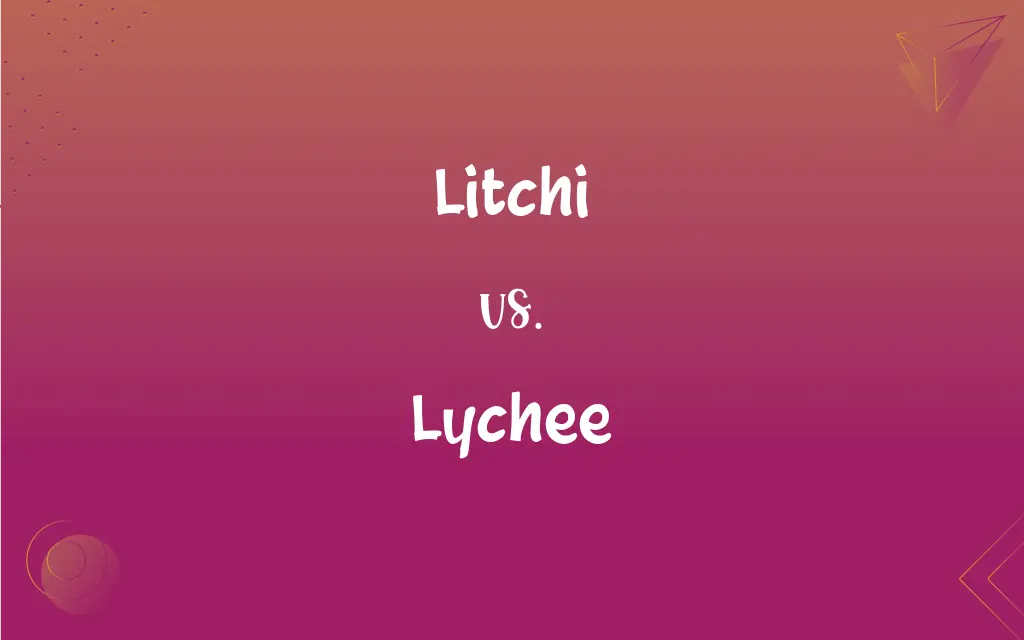Litchi vs. Lychee: What's the Difference?
By Janet White || Updated on May 20, 2024
Litchi and lychee refer to the same tropical fruit, known for its sweet, aromatic flavor and rough, red skin. "Litchi" is the British spelling, while "lychee" is the American spelling.

Key Differences
Litchi and lychee are terms used to describe the same fruit, scientifically named Litchi chinensis. This fruit is native to the Guangdong and Fujian provinces of China and is cherished for its sweet, floral taste. The difference between the two terms lies primarily in regional spelling variations.
Despite the spelling differences, both terms describe the same fruit, which features a rough, red outer skin and a sweet, translucent white flesh. Litchi and lychee are often eaten fresh, canned, or used in beverages, desserts, and salads. The fruit is also prized for its nutritional value, being rich in vitamin C and antioxidants.
The usage of litchi or lychee does not impact the fruit's culinary or nutritional characteristics. It remains a popular fruit in many cultures, celebrated for its unique flavor and versatility in cooking and food preparation.
Comparison Chart
Spelling Origin
British English
American English
Common Regions
UK, Commonwealth countries
USA, regions using American English
ADVERTISEMENT
Scientific Name
Litchi chinensis
Litchi chinensis
Description
Tropical fruit with sweet, floral taste
Same fruit with identical qualities
Usage
Fresh, canned, in desserts and beverages
Fresh, canned, in desserts and beverages
Litchi and Lychee Definitions
Litchi
The British English term for the tropical fruit lychee.
She enjoyed a refreshing litchi sorbet on a hot day.
Lychee
The American English term for the tropical fruit litchi.
He made a lychee smoothie for breakfast.
ADVERTISEMENT
Litchi
Often used in British and Commonwealth culinary contexts.
Litchi jelly was served at the afternoon tea.
Lychee
Commonly used in American culinary contexts.
The lychee-flavored ice cream was a hit at the party.
Litchi
Rich in vitamin C and antioxidants.
A single litchi provides a substantial amount of vitamin C.
Lychee
Known for its health benefits, including high vitamin C.
Lychee is often praised for its antioxidant properties.
Litchi
Known for its rough, red skin and sweet, white flesh.
The market had a fresh batch of litchi on display.
Lychee
Recognizable by its rough, red outer skin and juicy flesh.
Lychee is a popular ingredient in Asian cuisine.
Litchi
Can be eaten fresh or used in various dishes.
They added litchi to the fruit salad for extra sweetness.
Lychee
Used in fresh and canned forms in various recipes.
Canned lychee was added to the tropical fruit punch.
Litchi
Variants of lychee.
Lychee
An evergreen tree (Litchi chinensis) native to China, cultivated for its bright red fruits with sweet white pulp surrounding a large seed.
Litchi
Synonym of lychee
Lychee
The fruit of this tree.
Litchi
The fruit of a tree native to China (Nephelium Litchi). It is nutlike, having a rough but tender shell, containing an aromatic pulp, and a single large seed. In the dried fruit which is exported the pulp somewhat resembles a raisin in color and form.
Lychee
The dried fruit of this tree. Also called lychee nut.
Litchi
A genus of East Indian sapindaceous trees consisting of a single species (Litchi Chinensis, syn. Nephelium Litchi) which bears the litchi nut.
Lychee
The Chinese tropical fruit tree Litchi chinensis, of the soapberry family.
Litchi
Chinese tree cultivated especially in Philippines and India for its edible fruit; sometimes placed in genus Nephelium
Lychee
That tree's bright red oval fruit with a single stone surrounded by a fleshy white aril.
Litchi
Chinese fruit having a thin brittle shell enclosing a sweet jellylike pulp and a single seed; often dried
Lychee
A soft pink-red colour, like that of a lychee rind (also called lychee red).
Lychee
See Litchi.
Lychee
Chinese fruit having a thin brittle shell enclosing a sweet jellylike pulp and a single seed; often dried
FAQs
Where is the term litchi commonly used?
The term litchi is commonly used in British English-speaking countries.
Where is the term lychee commonly used?
The term lychee is commonly used in American English-speaking countries.
What is lychee?
Lychee is the American English term for the tropical fruit also known as litchi.
Are litchi and lychee the same fruit?
Yes, litchi and lychee are the same fruit with different spellings.
What is litchi?
Litchi is the British English term for the tropical fruit also known as lychee.
What does litchi/lychee taste like?
Litchi/lychee has a sweet, floral taste.
Can litchi/lychee be used in cooking?
Yes, litchi/lychee can be used in a variety of dishes, including salads, desserts, and drinks.
What are some popular dishes using litchi/lychee?
Popular dishes include litchi/lychee sorbet, jelly, and fruit salad.
Is there any difference in the taste between litchi and lychee?
No, there is no difference in taste; they are the same fruit.
What is the scientific name for litchi/lychee?
The scientific name for litchi/lychee is Litchi chinensis.
Can litchi/lychee be canned?
Yes, litchi/lychee can be canned and is often available in this form.
Is litchi/lychee nutritious?
Yes, litchi/lychee is rich in vitamin C and antioxidants.
How is litchi/lychee commonly eaten?
Litchi/lychee is commonly eaten fresh, canned, or used in desserts and beverages.
Is litchi/lychee used in beverages?
Yes, litchi/lychee is often used in juices, cocktails, and smoothies.
Does litchi/lychee have a seed?
Yes, litchi/lychee contains a single large seed inside.
What does the skin of litchi/lychee look like?
The skin of litchi/lychee is rough and red.
Are there different varieties of litchi/lychee?
Yes, there are several varieties of litchi/lychee, differing in size and flavor nuances.
How should litchi/lychee be stored?
Litchi/lychee should be stored in a cool place or refrigerated to maintain freshness.
What are the health benefits of litchi/lychee?
Litchi/lychee offers health benefits such as high vitamin C content and antioxidants.
What is the texture of litchi/lychee flesh?
The flesh of litchi/lychee is juicy and slightly firm.
About Author
Written by
Janet WhiteJanet White has been an esteemed writer and blogger for Difference Wiki. Holding a Master's degree in Science and Medical Journalism from the prestigious Boston University, she has consistently demonstrated her expertise and passion for her field. When she's not immersed in her work, Janet relishes her time exercising, delving into a good book, and cherishing moments with friends and family.
































































